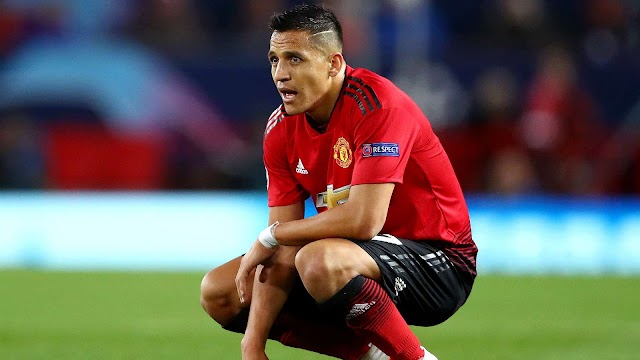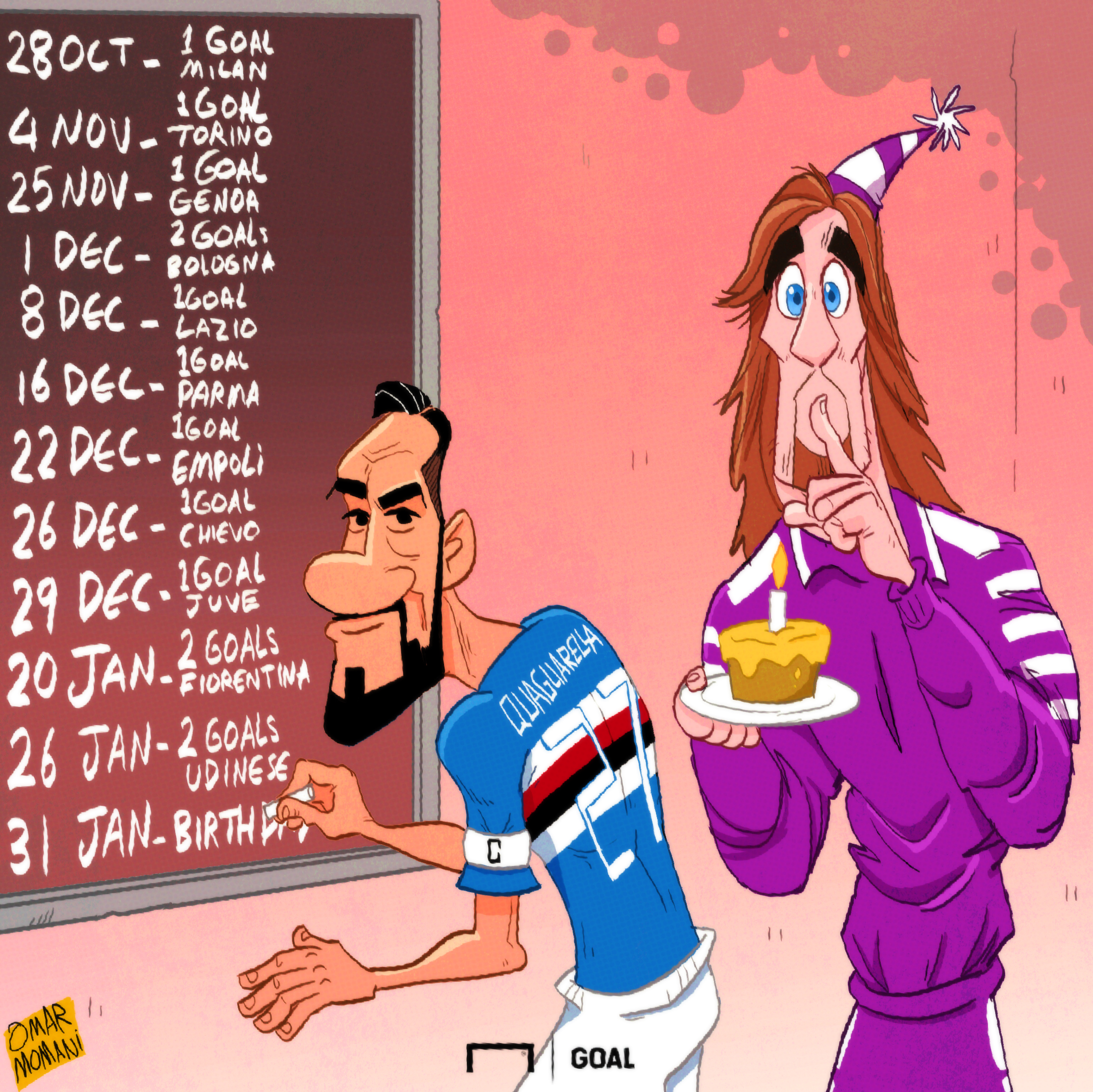The veteran netted for the 11th straight Serie A game last weekend and can now make history in his native Naples - a city where he endured torture.
"You’ve lived through hell with enormous dignity. We will embrace you again, Fabio, son of this city."
- Napoli banner at the San Paolo, March 12, 2017
Fabio Quagliarella has made a point of never celebrating goals against former clubs.
Yet Quagliarella's reaction to a remarkable feat was understated; a characteristically classy show of respect.
When asked about the record afterwards, though, Quagliarella struggled to hold back the tears.
"I'm sorry," he told Sky Sport Italia. "I get emotional because just to be able to imagine something like that...
"It's unthinkable. Just naming Batistuta gives me goosebumps!"
Quagliarella's tears were about more than history, though.
"This is my life," he explained. "All that happened in the past and all these sacrifices led to this; something I never thought could happen."
Indeed, for almost five years, Quagliarella lived in a constant state of fear and paranoia, the victim of a stalker who not only terrorised him and his family, but also turned his fellow Neapolitans against him.
The nightmare began shortly after the Castellammare di Stabia native had completed a dream move to Napoli in 2009.
The €18 million signing from Udinese was 26 at the time, an
Italy international and playing for his hometown club. He could not have been happier.
However, not long after his return, Quagliarella had a seemingly innocuous password problem with his PC and his best friend, Giulio, introduced him to Raffaelle Piccolo.
A computer expert with the postal police, Piccolo quickly resolved the issue and, as Quagliarella later told Le Iene: "From there, a friendship was born."
Not long after their meeting, though, the forward began to receive "hundreds and hundreds" of anonymous letters and messages.
"Anything from photos of naked girls, where he said underneath that I was a paedophile, or that I was involved with the Camorra, or that I was doing drugs, or guilty of illegal football betting," he revealed.
"Also, whenever I was in Naples, my Dad received messages saying, 'Your son is around Castellammare and now we are going to break his legs.' Or 'Now we will kill him.'"
In his desperation, Quagliarella unsurprisingly turned to Piccolo for advice, given his new friend's police background.
"Obviously he was a person who had become a part of the family," he said. "There was a relationship there.
"He always repeated: 'We are almost there, we are about to catch the guy, just a little more time.' And he told us "Do not tell anyone, not even your children.'
"So, you're afraid, you don't talk to anyone. I only spoke to my mother and father. Not even my brothers knew about it."
So, Quagliarella suffered in silence, praying that Piccolo would once again come to his rescue.
However, when Napoli then received similar messages accusing Quagliarella of paedophilia and cocaine abuse, the course of Quagliarella's career was altered irrevocably.
"[Club president] Aurelio De Laurentiis used to call me every day, but after those letters he advised to me to leave my hometown Castellammare di Stabia to go live in a hotel, to be calmer and relaxed," the forward told Mediaset .
"But after that conversation that took place in Napoli's headquarters, he had never called me again."
Instead, Quagliarella was informed just before a pre-season fixture in the summer of 2010 that he had been sold to
Juventus. "It was a moment of shock," he confessed.
What made his sudden departure all the more painful was that he could not explain to his fellow Neapolitans why he was leaving. He had not wanted to go; let alone without being able to explain why.
"I always had imagined myself as captain of Napoli; of winning something with them because they were becoming as good a team as they are now," Quagliarella admitted.
"If none of this had happened, I am certain I would still be playing there now."
Instead, every time he returned home, he was forced to disguise himself for fear of being confronted by those who viewed him as "a traitor".
He had wanted to explain why he had left, what he was going through, but feared jeopardising the investigation.
So, he put up with the insults, the whistles, and the boos because he understood them. As a proud son of Naples, he knew why his people had disowned him. They felt he had betrayed them, and the city.
He saw their anger as a reflection of how much they had cared for him, as one of their own. So, he refused to celebrate every time he scored against Napoli, even if that created further problems for him.
Torino fans actually turned against him when he put his hands together and asked for forgiveness from the Curva Sud for netting a penalty at the San Paolo in January 2016.
It was a conciliatory gesture that precipitated the end of his Torino career but Quagliarella was unperturbed. He was more concerned with showing his fellow Neapolitans that he still cared.
"I knew what was behind [their fury]," he mused. "And I knew that this affair could be closed from one moment to the next."
Indeed, Quagliarella's father eventually grew suspicious of Piccolo, the man who was supposedly helping his son track down the blackmailer.
When Quagliarella went to the police to see where they were at with the investigation, he discovered that none of the complaints he had filed had been received: "Piccolo had them all!"
Quagliarella's ordeal finally ended in February 2017 when Piccolo was sentenced to four years and eight months in jail, after being found guilty of blackmail and extortion.
“I wouldn't wish it upon anyone," the Italy international said after the verdict. "I couldn’t leave my house, neither could my family. I thank the courts for ensuring the truth came out."
Quagliarella’s relief quickly turned to anger, though.
"Being a policeman, he should’ve been punished even harder," he reasoned. "Instead, not a day in prison or even under house arrest. He keeps walking around as if nothing happened.
"He’s been transferred but continues to work. It’s a joke.
“If tomorrow he should come here on his hands and knees to beg forgiveness, I couldn’t care less. He asked for this, it’s only right he pay the price. Except he’s not.
"It’s not enough to call him a stalker, nor that he persecuted me: he tried to ruin my life.
"Seeing as nine years of a life are not crumbs and nobody can give that time back to me, nor fix the damage he did to my family, I cannot forgive."
Quagliarella, though, is embracing what he calls his "second life", determined to make the most of his final few years at the highest level.
Finally free of the fear and paranoia that almost broke him, he is playing better than ever before.
Last season, he scored a career-high 19 goals for Samp. This term, he has already netted 16 times - including arguably the
Serie A goal of the season against Napoli in September when he flicked home an outrageous backheel volley through his own legs.
This weekend, in the corresponding fixture, he will return to Napoli not as a traitor but a hometown hero.
"[The banner against Crotone] was a beautiful gesture that reconciled me with my people," he enthused.
Quagliarella had always said that the 11 goals he scored for Napoli felt like 100 because of what they meant to him.
At 36, he may not get another chance to score a goal for his beloved Partenopei, and he won't celebrate if he nets against them on Saturday either.
But his people should celebrate him: Fabio Quagliarella, history-maker, and, more importantly, proud son of Naples.









0 Comments